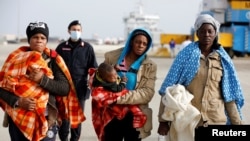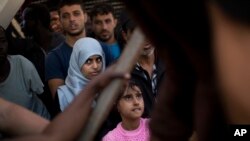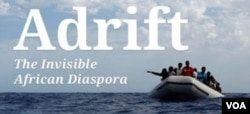A code of conduct drafted by the Italian government setting out new rules for refugee-rescue ships operating in the Mediterranean is drawing the anger of charities and rights groups, who claim the code will risk thousands of lives.
Under the proposal, which the European Union approved Monday, refugee-rescue vessels operated by charities are barred from coordinating with people-smugglers by phone or using lights to signal their location. They are now restricted to patrolling in international waters, not in Libyan territorial waters where they can pick up asylum-seekers closer to shore.
Any vessel discovered to have breached the code risks being banned from docking at Italian ports.Humanitarian ships now pick up more than a third of all migrants attempting the perilous Mediterranean crossing from Libya to Italy, compared to one percent in 2014.
Accusations of collusion
An intense debate has erupted in Italy about whether refugee-rescue ships have inadvertently encouraged the migration. Some in Italy accuse humanitarian agencies of colluding with people-smugglers by arranging pick-up locations. Humanitarian groups dismiss the claims and point to two parliamentary probes that found no misconduct on their part.
"Given the scale of tragedies at sea and the horrific abuses migrants and asylum-seekers face in Libya, the EU should work with Italy to enhance robust search and rescue in the waters off Libya, not limit it," said Judith Sunderland of Human Rights Watch.
The adopted code would allow rescue vessels to enter Libyan waters if there’s imminent danger of loss of life.But Sunderland told VOA, “The code will translate into fewer vessels being in the rescue area and some provisions will make it harder for smaller NGOs to operate.”
The code is the latest move by Rome to try to curb the record numbers of migrants and it comes amid rising anti-immigrant sentiment buffeting the government of Prime Minister Paolo Gentiloni.
Numbers rising
More than 86,000 migrants have reached Italy this year, a 10 percent increase on the same period last year, according to the International Office for Migration. The migrants in detention centers and temporary shelters have reached Italy's capacity of 200,000. But the number of migrants in Italy is much higher, thousands have left shelters to work illegally.
The head of Gentiloni’s Democratic Party, former prime minister Matteo Renzi, has started to parrot the slogan used by the anti-migrant Northern League party, "Let's help them in their homes," meaning more aid for sub-Saharan countries, where most migrants come from, and no welcome for them to settle in Europe.
Gentiloni has had to drop a hotly-contested new citizenship law that would have granted citizenship to tens of thousands of migrant children born or resident in Italy. There is also a mounting rebellion from municipal mayors over the resettlement of asylum-seekers.
At the weekend, 40 Sicilian mayors held a meeting to complain they are ready to welcome migrants, but not ready to cope with the higher numbers the government is foisting on them.
Gentiloni has accused fellow EU nations of "looking the other way," and not doing enough to assist Italy with the surge in migrants crossing the Mediterranean. Libya is the main gateway to Europe for migrants and refugees from Africa, the Arabian Peninsula, Syria and Bangladesh. Many are fleeing war and persecution, but most are considered "economic migrants" fleeing poverty, drought and the dysfunction of their own countries.
The number of migrants is on track to exceed the 200,000 who landed in Italy in 2016. Around 15 percent of those arriving this year are Nigerian, 12 percent Bangladeshi and 10 percent Guineans.
Gentiloni and his advisers have threatened to trigger an obscure EU Balkans War-era directive to issue temporary EU visas to asylum-seekers currently in Italy, which would allow them to travel legally to other EU countries, something Italy's immediate neighbors, France and Austria, oppose.
Earlier this month, Austrian Defense Minister Hans Peter Doskozil warned he’s ready to deploy troops on the Brenner Pass separating Austria and Italy to stop migrants crossing.
French President Emmanuel Macron said last week after meeting with Gentiloni and German Chancellor Angela Merkel that most of those who travel to Italy are economic migrants not war refugees and that France can’t admit economic migrants.
The Italian ambassador to Britain, Pasquale Terracciano, says Italy has little choice but to start clamping down and he warns, "If there’s no solidarity from other EU countries there will be a situation where our ports will be overwhelmed and the situation will be untenable." He added, "There’s a sense of despair in Italy…there is anger we are left alone only."
Italy’s EU neighbors have only taken in 7,300 of the asylum-seekers who disembarked at Italian ports.






